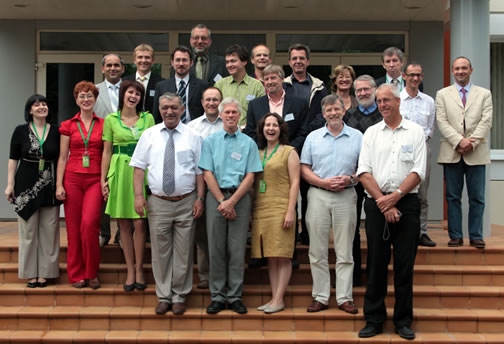
13th Meeting of the EPPO Panel on Quarantine Pests for Forestry
Bykovo, RU, 2009-06-30/07-02
This meeting took place in Bykovo (RU) in the Russian National Plant Quarantine Centre (VNIIKR). The Panel discussed countries’ comments on the draft EPPO commodity standard for Castanea and Quercus (PM 8/3(1)), and agreed amendments. The Panel rejected the inclusion of pests not listed in the EPPO A1 and A2 Lists in the standard. The Panel rediscussed more in detail requirements concerning Cryphonectria parasitica and Ceratocystis fagacearum.
The Panel discussed the draft revision of PRA performed for Bursaphelenchus xylophilus (Pine Wood Nematode), as well as the draft revision of the EPPO standard PM 9/1 (Official control of Pine Wood Nematode) and countries’ comments and comments from the EPPO Working Party for Phytosanitary Regulations. The Panel agreed that the radius for the clear-cut zone should be linked to the density of the host trees and may range from 500 to 3000 m around the infested tree or around the edge of the infested area. The Panel agreed that the standard described the procedures for official control with the aim of containing and eradicating B. xylophilus in areas where infestation of susceptible coniferous species by B. xylophilus leads to wilt symptoms. Further discussion is needed on whether recommended measures are sufficiently effective in areas with asymptomatic trees.
The Panel discussed how outbreaks of Agrilus planipennis (Emerald Ash Borer) should be dealt with, reviewed all information available on the pest and visited the outbreak areas in Moscow. The Panel considered the possibilities of pest survey, containment and eradication under the draft of the draft EPPO standard PM 9/8(1) (National Regulatory Control System for Official control of Agrilus planipennis). The Panel concluded that the main obstacle was the absence of early detection methods and that further reflection is needed to discuss diversified approaches to eradication or control of the pest.
Concerning Chalara fraxinea, the Panel agreed that a special workshop is required and that this could be combined with the next Panel meeting (planned in Norway in July 2010) to bring together experts and discuss pest identity, hosts, spread, possible control measures and the areas at risk.


